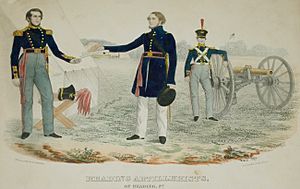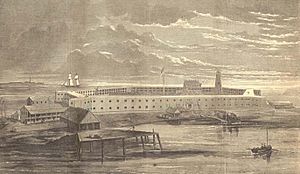George Warren Alexander facts for kids
Quick facts for kids
George Warren Alexander
|
|
|---|---|
| Born | May 9, 1829 |
| Died | May 5, 1903 |
| Nationality | American |
| Other names | G. W. Alexander |
| Occupation | Founder and operator, G. W. Alexander & Co., a successful hat factory in Berks County, Pennsylvania |
| Known for | Military service with the Reading Artillerists (captain); 1st Pennsylvania Infantry (captain, Company G); 47th Pennsylvania Infantry (lieutenant colonel and second in command) |
| Spouse(s) | Harriet N. Appleton |
George Warren Alexander was an important person from New Hampshire who made big contributions to the towns of Reading and West Reading in Berks County, Pennsylvania. He lived from the mid-1800s to the early 1900s.
Born on May 9, 1829, George was the son of Philip C. and Mary Ann Alexander. Most people knew him as "G.W." Records show he was born in Derry, New Hampshire.
By 1850, Alexander had moved to Holyoke, Massachusetts. He lived there with his parents and sisters. His future wife, Harriet N. Appleton, also lived with them. G.W. and Harriet got married in Holyoke on September 10, 1851. After their wedding, they moved to Reading, Pennsylvania.
Contents
Military Service and Leadership
Soon after moving to Berks County, G.W. Alexander joined a local military group called the Reading Artillerists. In 1857, he became their captain. This group had a long and proud history. They served as bodyguards for U.S. President George Washington in 1794. They also helped stop the Whiskey Rebellion in 1799. Later, they fought in the War of 1812 and the Mexican–American War.
In 1861, a newspaper called the Reading Times confirmed that G.W. Alexander was still their commanding officer. He even put out a notice for his troops:
Reading Artillerists, Attention!
You will meet this evening at 7 o’clock, at the Armory, 5th and Washington sts., for the purpose of transacting important business. Punctual attendance is requested.
By order,
WM. MCNALL, O.S.G. W. ALEXANDER,
Captain.
Serving in the Civil War
When the Civil War began, President Abraham Lincoln asked for 75,000 soldiers to protect Washington, D.C.. This was after Confederate forces took over Fort Sumter. George W. Alexander, who was 31, joined the army in Reading.
Three Months of Service
Alexander became a captain in Company G of the 1st Pennsylvania Infantry. He started his duty in Harrisburg on April 20, 1861. For three months, his group often guarded important places like railroads and main roads. They also occupied towns in Maryland and Virginia. After their service, Alexander and his fellow soldiers left the army on July 23, 1861.
Three Years of Service
George W. Alexander decided to join the army again for three years. He signed up on August 5, 1861. At 32 years old, he became a lieutenant colonel with the new 47th Pennsylvania Infantry. He was the second-in-command of this regiment. They officially joined the U.S. Army on September 24, 1861, near Washington, D.C.
The 47th Pennsylvania Volunteers first helped defend Washington, D.C. Then, in January 1862, they were sent to Florida. They arrived in Key West in February and were assigned to guard Fort Taylor.
From October 1-3, Alexander and his men helped capture Saint John's Bluff in Florida. Later, the regiment faced many challenges during the Battle of Pocotaligo in South Carolina, from October 21-23, 1862. Many soldiers were wounded or died in this battle.
On November 15, 1862, the 47th Pennsylvania Volunteers were sent back to Fort Taylor. On December 22, Alexander was ordered to take some of his men to the remote Dry Tortugas off the coast of Florida. There, they guarded Fort Jefferson. Alexander and his men stayed there until February 1864, when they rejoined the rest of their regiment in Key West.
In late February 1864, the 47th Pennsylvania was ordered to join Major-General Nathaniel Banks' forces in the west. They traveled by steamship to Louisiana. The 47th Pennsylvania was the only regiment from the Keystone State to fight in the 1864 Red River Campaign. During their first major battle there, the Battle of Sabine Cross Roads on April 8, 1864, Alexander was seriously wounded in both legs.
Alexander officially left the 47th Pennsylvania Volunteers on September 23, 1864, after his three-year service ended. However, the Reading Times newspaper reported that he returned home earlier, on September 20, 1864. The newspaper said, "Col. G. W. Alexander of the 47th P.V., arrived home on Saturday, after a protracted absence, during which he has seen much service. His many friends will be glad to hear that he is well and hearty."
Life After the War and the Hat Company
After the Civil War, George W. Alexander returned to civilian life in Reading. By 1880, he had moved with his family to West Reading. There, he started a successful business called G.W. Alexander & Co., a hat factory.
His hat factory grew and became very successful, employing about 300 people. Even after a fire forced him to rebuild, the company continued to do well. The Reading Eagle newspaper wrote about his factory:
Alexander & Co.'s hat factory is one of the principal industrial establishments and a most interesting place to visit. The firm is engaged in manufacturing fur hats and its plant is equipped with all the latest improved machinery put in at great expense. Forty hands are employed and excellent wages are made by the employees. The venture made by the firm in entering the fur hat trade is already a success and they contemplate an increase of their factory so as to probably employ 100 men in all.
The article also mentioned that Alexander, along with J. G. Yarnell and Daniel Moser, helped bring street lighting to West Reading. They formed a company to do this, and lamp posts with coal oil lamps were placed all over the town, making it much brighter and safer.
Later Life and Legacy
G.W. Alexander passed away in Reading on May 5, 1903. He was buried at the Charles Evans Cemetery in Reading, along with his wife and two of his daughters, Sallie and Nettie, who had died before him. News of his death was shared in newspapers across Pennsylvania.
External resources
- *Hardee, William Joseph. Hardee’s Rifle and Light Infantry Tactics. Memphis, Tennessee: E.C. Kirk & Co., 1861.
 | Shirley Ann Jackson |
 | Garett Morgan |
 | J. Ernest Wilkins Jr. |
 | Elijah McCoy |



